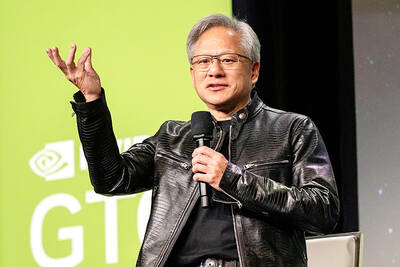Apple Inc is planning to expand its investment in Taiwan by building a new plant in the Longtan (龍潭) section of Hsinchu Science Park (新竹科學園區), the Hsinchu Science Park Bureau said yesterday.
The administration on Feb. 18 approved a plan by Apple’s Taiwan branch to set up a new plant in Longtan, Taoyuan, where the US firm has its existing operations, according to company registration data obtained by the Central News Agency.
Chang Shih-chang (張世昌), a former executive at TPO Displays Corp (統寶光電), is expected to take charge of the new Apple plant.
TPO Displays was acquired by panel maker Innolux Corp (群創光電) in 2010.
Sources with knowledge of the plan said that the new plant would be built on a 30.83 hectare plot as part of the second phase of the Longtan section of the park.
While sources at the administration declined to disclose any financial terms or details about the plan, the Chinese-language Economic Daily News yesterday reported that the investment is expected to be about NT$10 billion (US$334.9 million).
The report said that the initial phase of the plan is to boost next-generation monitor production, as well as research and development (R&D) of monitor technologies.
The US firm is developing low-temperature polysilicon displays and metal-oxide-semiconductor screens at the park, along with quantum film image sensors, sources at the science park said.
The report cited unnamed sources as saying that the plant has been listed as a major project by Apple and that the US company has dispatched an R&D team to Taiwan to facilitate the investment.
Apple is planning to collaborate with LED lighting maker Epistar Corp (晶電) and panel maker AU Optronics Corp (友達光電) on monitor development to reduce the US company’s dependence on Japanese and South Korean suppliers, the report said.
Apple has been running a laboratory in Longtan since 2014 and with the new investment, the company is aiming to produce mini-LED and micro-LED displays, it said.
The Longtan plant is expected to become Apple’s third overseas R&D hub after Japan and South Korea, it added.

‘DECENT RESULTS’: The company said it is confident thanks to an improving world economy and uptakes in new wireless and AI technologies, despite US uncertainty Pegatron Corp (和碩) yesterday said it plans to build a new server manufacturing factory in the US this year to address US President Donald Trump’s new tariff policy. That would be the second server production base for Pegatron in addition to the existing facilities in Taoyuan, the iPhone assembler said. Servers are one of the new businesses Pegatron has explored in recent years to develop a more balanced product lineup. “We aim to provide our services from a location in the vicinity of our customers,” Pegatron president and chief executive officer Gary Cheng (鄭光治) told an online earnings conference yesterday. “We

It was late morning and steam was rising from water tanks atop the colorful, but opaque-windowed, “soapland” sex parlors in a historic Tokyo red-light district. Walking through the narrow streets, camera in hand, was Beniko — a former sex worker who is trying to capture the spirit of the area once known as Yoshiwara through photography. “People often talk about this neighborhood having a ‘bad history,’” said Beniko, who goes by her nickname. “But the truth is that through the years people have lived here, made a life here, sometimes struggled to survive. I want to share that reality.” In its mid-17th to

LEAK SOURCE? There would be concern over the possibility of tech leaks if TSMC were to form a joint venture to operate Intel’s factories, an analyst said Taiwan Semiconductor Manufacturing Co (TSMC, 台積電) yesterday stayed mum after a report said that the chipmaker has pitched chip designers Nvidia Corp, Advanced Micro Devices Inc and Broadcom Inc about taking a stake in a joint venture to operate Intel Corp’s factories. Industry sources told the Central News Agency (CNA) that the possibility of TSMC proposing to operate Intel’s wafer fabs is low, as the Taiwanese chipmaker has always focused on its core business. There is also concern over possible technology leaks if TSMC were to form a joint venture to operate Intel’s factories, Concord Securities Co (康和證券) analyst Kerry Huang (黃志祺)

‘MAKE OR BREAK’: Nvidia shares remain down more than 9 percent, but investors are hoping CEO Jensen Huang’s speech can stave off fears that the sales boom is peaking Shares in Nvidia Corp’s Taiwanese suppliers mostly closed higher yesterday on hopes that the US artificial intelligence (AI) chip designer would showcase next-generation technologies at its annual AI conference slated to open later in the day. The GPU Technology Conference (GTC) in California is to feature developers, engineers, researchers, inventors and information technology professionals, and would focus on AI, computer graphics, data science, machine learning and autonomous machines. The event comes at a make-or-break moment for the firm, as it heads into the next few quarters, with Nvidia CEO Jensen Huang’s (黃仁勳) keynote speech today seen as having the ability to